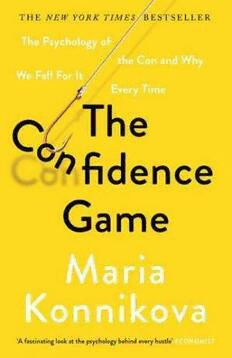
The Confidence Game: The Psychology of the Con and Why We Fall for It Every Time PDF
Preview The Confidence Game: The Psychology of the Con and Why We Fall for It Every Time
ALSO BY MARIA KONNIKOVA Mastermind First published in Great Britain in 2016 by Canongate Books Ltd, 14 High Street, Edinburgh EH1 1TE The digital edition first published by Canongate in 2012 www.canongate.co.uk Copyright © Maria Konnikova, 2016 The moral right of the author has been asserted First published in 2016 in the United States by Viking, an imprint of Penguin Random House, 375 Hudson St., New York, NY 10014, USA British Library Cataloguing-in-Publication Data A catalogue record for this book is available on request from the British Library ISBN 978 1 78211 390 4 For my parents, Jane and Vitaly, who taught me that life is never fair, nothing comes for free, and there’s no such thing as the exception to the rule How cheerfully he seems to grin, How neatly spreads his claws, And welcomes little fishes in With gently smiling jaws! —LEWIS CARROLL, ALICE’S ADVENTURES IN WONDERLAND CONTENTS INTRODUCTION CHAPTER 1 THE GRIFTER AND THE MARK CHAPTER 2 THE PUT-UP CHAPTER 3 THE PLAY CHAPTER 4 THE ROPE CHAPTER 5 THE TALE CHAPTER 6 THE CONVINCER CHAPTER 7 THE BREAKDOWN CHAPTER 8 THE SEND AND THE TOUCH CHAPTER 9 THE BLOW-OFF AND THE FIX CHAPTER 10 THE (REAL) OLDEST PROFESSION ACKNOWLEDGMENTS NOTES INDEX INTRODUCTION The aristocrats of crime. —DAVID MAURER D r. Joseph Cyr, a surgeon lieutenant of the Royal Canadian Navy, walked onto the deck of the HMCS Cayuga. It was September 1951, the second year of the Korean War, and the Cayuga was making her way north of the thirty-eighth parallel, just off the shore of North Korea. The morning had gone smoothly enough; no sickness, no injuries to report. But just as the afternoon was getting on, the lookouts spotted something that didn’t quite fit with the watery landscape: a small, cramped Korean junk that was waving a flag and frantically making its way toward the ship. Within the hour, the rickety boat had pulled up alongside the Cayuga. Inside was a mess of bodies, nineteen in all, piled together in obvious filth. They looked close to death. Mangled torsos, bloody, bleeding heads, limbs that turned the wrong way or failed to turn at all. Most of them were no more than boys. They had been caught in an ambush, a Korean liaison officer soon explained to the Cayuga’s crew; the messy bullet and shrapnel wounds were the result. That’s why Dr. Cyr had been summoned from below deck: he was the only man with any medical qualification on board. He would have to operate—and soon. Without his intervention, all nineteen men would very likely die. Dr. Cyr began to prepare his kit. There was only one problem. Dr. Cyr didn’t hold a medical degree, let alone the proper qualifications required to undertake complex surgery aboard a moving ship. In fact, he’d never even graduated high school. And his real name wasn’t Cyr. It was Ferdinand Waldo Demara, or, as he would eventually become known, the Great Impostor—one of the most successful confidence artists of all time, memorialized, in part, in Robert Crichton’s 1959 account The Great Impostor. His career would span decades, his disguises the full gamut of professional life. But nowhere was he more at home than in the guise of the master of human life, the doctor. Over the next forty-eight hours, Demara would somehow fake his way through the surgeries, with the help of a medical textbook, a field guide he had persuaded a fellow physician back in Ontario to create “for the troops” in the event a doctor wasn’t readily available, copious antibiotics (for the patients) and alcohol (for himself), and a healthy dose of supreme confidence in his own abilities. After all, he’d been a doctor before. Not to mention a psychologist. And a professor. And a monk (many monks, in fact). And the founder of a religious college. Why couldn’t he be a surgeon? As Demara performed his medical miracles on the high seas, makeshift operating table tied down to protect the patients from the roll of the waves, a zealous young press officer wandered the decks in search of a story. The home office was getting on his back. They needed good copy. He needed good copy. Little of note had been happening for weeks. He was, he joked to his shipmates, practically starving for news. When word of the Korean rescue spread among the crew, it was all he could do to hide his excitement. Dr. Cyr’s story was fantastic. It was, indeed, perfect. Cyr hadn’t been required to help the enemy, but his honorable nature had compelled him to do so. And with what results. Nineteen surgeries. And nineteen men departing the Cayuga in far better shape than they’d arrived. Would the good doctor agree to a profile, to commemorate the momentous events of the week? Who was Demara to resist? He had grown so sure of his invulnerability, so confident in the borrowed skin of Joseph Cyr, MD, that no amount of media attention was too much. And he had performed some pretty masterful operations, if he might say so himself. Dispatches about the great feats of Dr. Cyr soon spread throughout Canada. Dr. Joseph Cyr, original version, felt his patience running out. It was October 23, and there he was, sitting quietly in Edmunston, trying his damnedest to read a book in peace. But they simply wouldn’t leave him alone. The phone was going crazy, ringing the second he replaced the receiver. Was he the doctor in Korea? the well-intentioned callers wanted to know. Was it his son? Or another relative? No, no, he told anyone who
